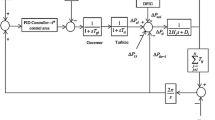Abstract
A new hierarchical parameter estimation method for doubly fed induction generator (DFIG) and drive train system in a wind turbine generator (WTG) is proposed in this paper. Firstly, the parameters of the DFIG and the drive train are estimated locally under different types of disturbances. Secondly, a coordination estimation method is further applied to identify the parameters of the DFIG and the drive train simultaneously with the purpose of attaining the global optimal estimation results. The main benefit of the proposed scheme is the improved estimation accuracy. Estimation results confirm the applicability of the proposed estimation technique.
Similar content being viewed by others
References
Rose J, Hiskens I A. Estimating wind turbine parameters and qualifying their effects on dynamic behavior. In: Proceedings of 2008 IEEE Power and Energy Society General Meeting Conversion and Delivery of Electrical Energy in the 21st Century. Pennsylvania, 2008, 1–7
Pan X, Ju P, Xu Q, et al. A two-step method for estimating DFIG parameters in a wind turbine and the measurement selection. Proceedings of the CSEE, 2013, 33(13): 116–126 (in Chinese)
IEEE Guide: Test Procedures for Synchronous Machines. IEEE Standard 115-2009, 2010
IEEE Guide: Identification, Testing, and Evaluation of the Dynamic Performance of Excitation Control Systems. IEEE Standard 421.2- 1990, 1990
Asmine M, Brochu J, Fortmann J, et al. Model validation for wind turbine generator models. IEEE Transactions on Power Systems, 2011, 26(3): 1769–1782
Marvik J I, Endegnanew A G. Wind turbine model validation with measure. Energy Procedia, 2012, 24: 143–150
Jiménez F, Vigueras-Rodriguez A, Gómez-Lázaro E, et al. Validation of a mechanical model for fault ride-through: Application to a Gamesa G52 commercial wind turbine. IEEE Transactions on Energy Conversion, 2013, 28(3): 707–715
Jiménez F, Gómez-Lázaro E, Fuentes J A, et al. Validation of a double fed induction generator wind turbine model and wind farm verification following the Spanish grid code. Wind Energy (Chichester, England), 2012, 15(4): 645–659
Jiménez F, Gómez-Lázaro E, Fuentes J A, et al. Validation of a DFIG wind turbine model submitted to two-phase voltage dips following the Spanish grid code. Renewable Energy, 2013, 57: 27–34
Trilla L, Gomis-Bellmunt O, Junyent-Ferré A, et al. Modeling and validation of DFIG 3-MW wind turbine using field test data of balanced and unbalanced voltage sags. IEEE Transactions on Power Systems, 2011, 2(4): 509–519
Brochu J, Larose C, Gagnon R. Validation of single- and multiplemachine equivalents for modeling wind power plants. IEEE Transactions on Energy Conversion, 2010, 26(2): 532–541
Pedersen J K, Helgelsen-Pedersen K O, Kjølstad Poulsen N, et al. Contribution to a dynamic wind turbine model validation from a wind farm islanding experiment. Electric Power Systems Research, 2003, 64(1): 41–51
van der Veen G J, van Wingerden J W, Fleming P A, et al. Global data-driven modelling of wind turbines in the presence of turbulence. Control Engineering Practice, 2013, 21(4): 441–454
Kennedy J M, Fox B, Littler T, et al. Validation of fixed speed induction generator models for inertial response using wind farm measurements. IEEE Transactions on Power Systems, 2011, 26(3): 1454–1461
González-Longatt F, Regulski P, Wall P, et al. Fixed speed wind generator model parameter estimation using improved particle swarm optimization and system frequency disturbances. In: Proceedings of IET Conference on Renewable Power Generation. Edinburgh: IEEE, 2011, 1–6
Bekker J C, Vermeulen H J. Parameter estimation of a doubly-fed induction generator in a wind generation topology. In: Proceedings of 47th International Universities Power Engineering Conference (UPEC). London: IEEE, 2012, 1–6
Wu F, Zhang X, Godfrey K, et al. Small signal stability analysis and optimal control of a wind turbine with doubly fed induction generator. IET Generation, Transmission & Distribution, 2007, 1(5): 751–760
Mei F, Pal B C. Modal analysis of grid-connected doubly-fed induction generators. IEEE Transactions on Energy Conversion, 2007, 22(3): 728–736
Ju P, Wu F, Jin Y, et al. Modelling and Control of Renewable Power Generation System. Beijing: Science Press, 2014 (in Chinese)
Trelea I. The particle swarm optimization algorithm: Convergence analysis and parameter selection. Information Processing Letters, 2003, 85(6): 317–325
Acknowledgements
This research was supported by the National Natural Science Foundation of China (Major Program) (Grant Nos. 51190102 and 51207045).
Author information
Authors and Affiliations
Corresponding author
Rights and permissions
About this article
Cite this article
Pan, X., Ju, P., Wu, F. et al. Hierarchical parameter estimation of DFIG and drive train system in a wind turbine generator. Front. Mech. Eng. 12, 367–376 (2017). https://doi.org/10.1007/s11465-017-0429-y
Received:
Accepted:
Published:
Issue Date:
DOI: https://doi.org/10.1007/s11465-017-0429-y




